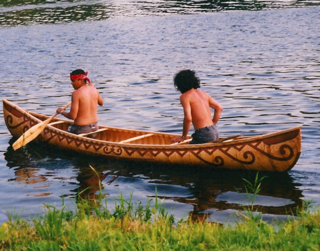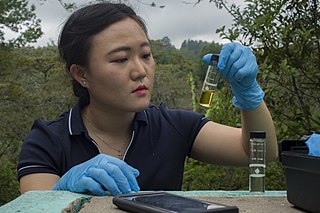
Perry is a town in Washington County, Maine, United States, on the Canada–United States border. At the 2020 census, the town had a population of 802.

Passamaquoddy Indian Township Reservation is one of two Indian reservations of the federally recognized Passamaquoddy tribe in Washington County, Maine, United States. The population was 760 at the 2020 census. Most of the 2,500 members of the tribe in the United States live in other parts of Maine. The reservation is located about 13 miles west-northwest of the city of Calais.
Water purification is the process of removing undesirable chemicals, biological contaminants, suspended solids, and gases from water. The goal is to produce water that is fit for specific purposes. Most water is purified and disinfected for human consumption, but water purification may also be carried out for a variety of other purposes, including medical, pharmacological, chemical, and industrial applications. The history of water purification includes a wide variety of methods. The methods used include physical processes such as filtration, sedimentation, and distillation; biological processes such as slow sand filters or biologically active carbon; chemical processes such as flocculation and chlorination; and the use of electromagnetic radiation such as ultraviolet light.

The Passamaquoddy are a Native American/First Nations people who live in northeastern North America. Their traditional homeland, Peskotomuhkatikuk, straddles the Canadian province of New Brunswick and the U.S. state of Maine in a region called Dawnland. They are one of the constituent nations of the Wabanaki Confederacy.

Tribal sovereignty in the United States is the concept of the inherent authority of Indigenous tribes to govern themselves within the borders of the United States.

Chlorine dioxide is a chemical compound with the formula ClO2 that exists as yellowish-green gas above 11 °C, a reddish-brown liquid between 11 °C and −59 °C, and as bright orange crystals below −59 °C. It is usually handled as an aqueous solution. It is commonly used as a bleach. More recent developments have extended its applications in food processing and as a disinfectant.
In chemistry, trihalomethanes (THMs) are chemical compounds in which three of the four hydrogen atoms of methane are replaced by halogen atoms. Trihalomethanes with all the same halogen atoms are called haloforms. Many trihalomethanes find uses in industry as solvents or refrigerants. Some THMs are also environmental pollutants, and few are considered carcinogenic.

The Safe Drinking Water Act (SDWA) is the principal federal law in the United States intended to ensure safe drinking water for the public. Pursuant to the act, the Environmental Protection Agency (EPA) is required to set standards for drinking water quality and oversee all states, localities, and water suppliers that implement the standards.
Melvin Joseph Francis was the governor of the Passamaquoddy Pleasant Point Reservation, one of two reservations in Maine of the Passamaquoddy Indian tribe, from 1980 until 1990 and again from 2002 until his death.
Maximum contaminant levels (MCLs) are standards that are set by the United States Environmental Protection Agency (EPA) for drinking water quality. An MCL is the legal threshold limit on the amount of a substance that is allowed in public water systems under the Safe Drinking Water Act (SDWA). The limit is usually expressed as a concentration in milligrams or micrograms per liter of water.

Haloacetic acids or HAAs are carboxylic acids in which one or more halogen atoms take the place of hydrogen atoms in the methyl group of acetic acid. Those acids have a general chemical formula X1X2X3C−CO2H, where X is hydrogen or halogen, and at least one X is a halogen. In a monohaloacetic acid, a single halogen replaces a hydrogen atom: for example, in bromoacetic acid. Further substitution of hydrogen atoms with halogens can occur, as in dichloroacetic acid and trichloroacetic acid.
In the United States, public drinking water is governed by the laws and regulations enacted by the federal and state governments. Certain ordinances may also be created at a more local level. The Safe Drinking Water Act (SDWA) is the principal federal law. The SDWA authorizes the United States Environmental Protection Agency (EPA) to create and enforce regulations to achieve the SDWA goals.
Disinfection by-products (DBPs) are organic and inorganic compounds resulting from chemical reactions between organic and inorganic substances such as contaminates and chemical treatment disinfection agents, respectively, in water during water disinfection processes.
Drinking water quality in the United States is generally safe. In 2016, over 90 percent of the nation's community water systems were in compliance with all published U.S. Environmental Protection Agency standards. Over 286 million Americans get their tap water from a community water system. Eight percent of the community water systems—large municipal water systems—provide water to 82 percent of the US population. The Safe Drinking Water Act requires the US EPA to set standards for drinking water quality in public water systems. Enforcement of the standards is mostly carried out by state health agencies. States may set standards that are more stringent than the federal standards.

Water chlorination is the process of adding chlorine or chlorine compounds such as sodium hypochlorite to water. This method is used to kill bacteria, viruses and other microbes in water. In particular, chlorination is used to prevent the spread of waterborne diseases such as cholera, dysentery, and typhoid.
Vera J. Francis is a Native American educator, environmental activist, and community planner for the Passamaquoddy people. She resides in Perry, Maine within the Passamaquoddy Pleasant Point Reservation (Sipayik). Francis writes and speaks frequently about environmental issues and tribal politics in newspapers, at conferences and on websites.

State Route 190 (SR 190) is a 7.1-mile (11.4 km) state highway that travels from Water Street in Eastport to U.S. Route 1 (US 1) in Perry. It serves as the connector route to Eastport from the mainland. Though the road travels in a southeast–northwesterly direction, the road is signed as north–south.
Concouguash, Christian name Francis Joseph Neptune, (1735–1834) was chief of the Passamaquoddy tribe during the American Revolutionary War. He succeeded his father, Bahgulwet, who died in 1778, and was succeeded by his own son, John Francis Neptune, in 1824. The term "chief" later became the word for governor. Becoming chief is passed along through family lineage and requires acceptance from the Passamaquoddies, Penobscots and Maliseet tribes. These three tribes share similar chief induction ceremonies, conducted simultaneously with eyewitnesses from each tribe present.
Rena D. Newell was the Passamaquoddy tribal representative to the Maine House of Representatives during the 129th and 130th legislatures. During her two terms, she was the only tribal representative in the Maine House.
Donald Cotesworth Gellers, also known by his Jewish name Tuvia Ben-Shmuel Yosef, was an American lawyer. In the 1960s he lived in Eastport, Maine, where he represented members of the Passamaquoddy tribe in court and advocated for their civil rights. In 1968 he filed a land claim suit on the tribe's behalf. Immediately after filing the suit he was charged with constructive possession of six marijuana cigarettes. He was convicted on a felony charge and sentenced to prison. After an unsuccessful appeal process, he moved to Israel without serving his sentence. He returned to the United States in 1980 and practiced as a rabbi until his death. In 2020 he was granted a posthumous pardon by the state of Maine.












